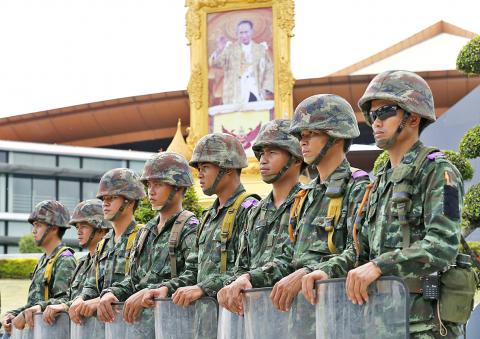Thailand’s army chief imposed martial law yesterday after months of deadly anti-government protests caused political paralysis, but insisted the intervention did not amount to yet another military coup.
Gun-toting troops fanned out after martial law was declared in a dawn broadcast, as General Prayuth Chau-ocha exploited centuries-old legislation that confers far-reaching powers on the armed forces to act in an emergency.
However, he left the caretaker civilian government in office and later invited the country’s warring political factions to sit down for talks, as the US, Japan and Southeast Asian nations urged Thailand to stay on a democratic track and resolve its differences peacefully.

Photo: EPA
Soldiers and military vehicles were seen in the heart of the capital’s retail and hotel district. Troops were also positioned at TV stations, where broadcasts were suspended under sweeping censorship orders, although regular Thais appeared largely unfazed.
The dismissal of former Thai prime minister Yingluck Shinawatra earlier this month in a court ruling has stoked tensions in the kingdom, which has endured years of political turmoil.
Red Shirt supporters of Yingluck and her brother, former Thai prime minister Thaksin Shinawatra, who was deposed in a 2006 coup, have warned of the threat of civil war if power is handed to an unelected leader, as the opposition demands.
Thaksin, who lives abroad to avoid a jail term for corruption, said on Twitter that the imposition of martial law was “expected,” but must not “destroy” democracy.
New York-based Human Rights Watch branded the imposition of martial law a “de facto coup,” voicing alarm at the impact on freedom of expression.
The government officially remained in office and Prayuth presented himself as a mediator.
“We are in the process of inviting both sides to talk but at the minute the situation is still not normal... that’s why I have had to invoke martial law,” he told reporters. “The military will not tolerate any more loss of lives.”
Martial law allows the army to ban public gatherings, restrict people’s movements, conduct searches, impose curfews and detain suspects for up to seven days.
Thailand has been without a fully functioning government since December last year, disrupting government spending, spooking investors and deterring tourists.
The early-hours announcement on military-run television said martial law had been invoked “to restore peace and order for people from all sides” after nearly seven months of protests that have left 28 people dead and hundreds wounded.
“This is not a coup,” it said. “The public do not need to panic, but can still live their lives as normal.”

Conflict with Taiwan could leave China with “massive economic disruption, catastrophic military losses, significant social unrest, and devastating sanctions,” a US think tank said in a report released on Monday. The German Marshall Fund released a report titled If China Attacks Taiwan: The Consequences for China of “Minor Conflict” and “Major War” Scenarios. The report details the “massive” economic, military, social and international costs to China in the event of a minor conflict or major war with Taiwan, estimating that the Chinese People’s Liberation Army (PLA) could sustain losses of more than half of its active-duty ground forces, including 100,000 troops. Understanding Chinese

The Ministry of Foreign Affairs (MOFA) yesterday said it is closely monitoring developments in Venezuela, and would continue to cooperate with democratic allies and work together for regional and global security, stability, and prosperity. The remarks came after the US on Saturday launched a series of airstrikes in Venezuela and kidnapped Venezuelan President Nicolas Maduro, who was later flown to New York along with his wife. The pair face US charges related to drug trafficking and alleged cooperation with gangs designated as terrorist organizations. Maduro has denied the allegations. The ministry said that it is closely monitoring the political and economic situation

‘SLICING METHOD’: In the event of a blockade, the China Coast Guard would intercept Taiwanese ships while its navy would seek to deter foreign intervention China’s military drills around Taiwan this week signaled potential strategies to cut the nation off from energy supplies and foreign military assistance, a US think tank report said. The Chinese People’s Liberation Army (PLA) conducted what it called “Justice Mission 2025” exercises from Monday to Tuesday in five maritime zones and airspace around Taiwan, calling them a warning to “Taiwanese independence” forces. In a report released on Wednesday, the Institute for the Study of War said the exercises effectively simulated blocking shipping routes to major port cities, including Kaohsiung, Keelung and Hualien. Taiwan would be highly vulnerable under such a blockade, because it

UNRELENTING: China attempted cyberattacks on Taiwan’s critical infrastructure 2.63 million times per day last year, up from 1.23 million in 2023, the NSB said China’s cyberarmy has long engaged in cyberattacks against Taiwan’s critical infrastructure, employing diverse and evolving tactics, the National Security Bureau (NSB) said yesterday, adding that cyberattacks on critical energy infrastructure last year increased 10-fold compared with the previous year. The NSB yesterday released a report titled Analysis on China’s Cyber Threats to Taiwan’s Critical Infrastructure in 2025, outlining the number of cyberattacks, major tactics and hacker groups. Taiwan’s national intelligence community identified a large number of cybersecurity incidents last year, the bureau said in a statement. China’s cyberarmy last year launched an average of 2.63 million intrusion attempts per day targeting Taiwan’s critical